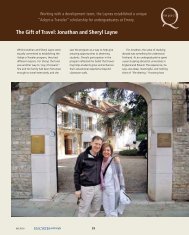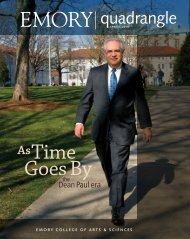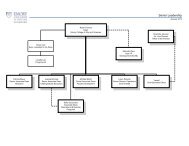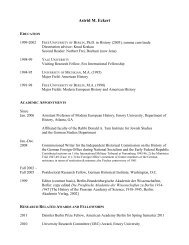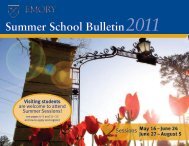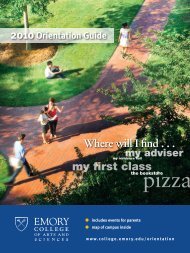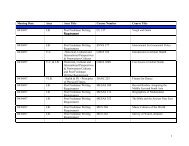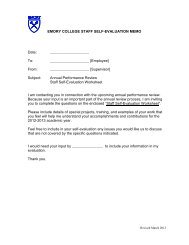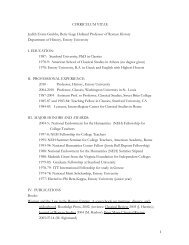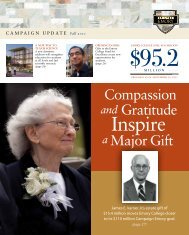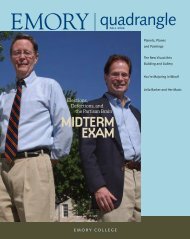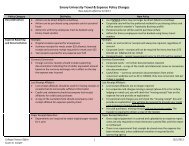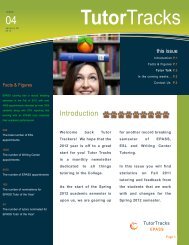2012 Summer School Bulletin - Emory College - Emory University
2012 Summer School Bulletin - Emory College - Emory University
2012 Summer School Bulletin - Emory College - Emory University
You also want an ePaper? Increase the reach of your titles
YUMPU automatically turns print PDFs into web optimized ePapers that Google loves.
of US foreign policy from the founding of the country to the present day. We will move<br />
between broad historical developments and specific moments in US foreign policy with an eye<br />
to pertinent films. The readings for the course reflect the three main interdisciplinary threads<br />
of the course: political science, history, and film studies. Books such as Steven H. Hook’s US<br />
Foreign Policy: The Paradoxes of World Power tackle political science theories around US<br />
foreign policy while David Ryan’s US Foreign Policy in World History and Hook and Spanier’s<br />
American Foreign Policy since World War II foreground a historical approach. Meanwhile,<br />
other readings will highlight the relationship between film and foreign policy more directly,<br />
such as selections from Melani McAlister’s Epic Encounters: Culture, Media, and US Interests<br />
in the Middle East, 1945–2000. Drawing on the critical vocabulary of these readings, you<br />
will practice close analysis—of both films and historical documents—and develop critical<br />
citizenship skills related to your place as part of US democracy. This course fulfills HAP<br />
General Education Requirement. Required textbooks: US Foreign Policy: The Paradoxes<br />
of World Power, Steven H. Hook; US Foreign Policy in World History, David Ryan; and<br />
American Foreign Policy since World War II, Steven W. Hook and John Spanier<br />
399-00A. INTERNSHIP/FILMMAKING PROJECTS<br />
TBD Faculty<br />
399-00C. INTERNSHIP/FILMMAKING PROJECTS<br />
TBD Faculty<br />
Prerequisites: Students must be film studies majors or minors and should be close to completing<br />
the course of study in film. Permission of a Film Studies faculty member is required in advance.<br />
This project course can involve an internship or film production. Students are to formulate<br />
their projects before approaching the member of the Film Studies faculty with whom they wish<br />
to work. The project should be discussed the semester before the internship is to be undertaken.<br />
Under no circumstances will retroactive credit be given. Although the Department of Film<br />
Studies occasionally can find internships for students, students are encouraged to arrange<br />
projects on their own. Requirements: Internships require a minimum of ten hours of work per<br />
Course Number Key and Dates<br />
00A: First session May 21 – June 29 00F: Miscellaneous Varies<br />
00B: Entire summer May 21 – August 10 0PA, 0PB, 0PC Permission required<br />
00C: Second Session July 2 – August 10<br />
MAY: Maymester May 15–June 1<br />
week, a journal, and an eight-page paper. Film production projects require a minimum of ten<br />
hours of work per week, the submission of production notes, and a final product.<br />
499-00A. INTERNSHIP/FILMMAKING PROJECTS<br />
TBD Faculty<br />
499-00C. INTERNSHIP/FILMMAKING PROJECTS<br />
TBD Faculty<br />
Prerequisites: Students must be film studies majors or minors and should be close to<br />
completing the course of study in film. Permission of a Film Studies faculty member is<br />
required in advance. A supervised project in an area of study to be determined by instructor<br />
and student in the semester preceding the independent study. Students are to formulate<br />
their projects before approaching the member of the Film Studies faculty with whom they<br />
wish to work. The project should be discussed the semester before the directed study is to<br />
be undertaken. Under no circumstances will retroactive credit be given. Directed readings<br />
are arranged with the instructor. Internships require a minimum of ten hours of work per<br />
week, a journal, and an eight-page paper.<br />
French<br />
101-00A. ELEMENTARY FRENCH I<br />
10:00–11:20 a .m . Daily . 1st session . Credit, 4 hrs . Faculty<br />
This beginning-level course uses an immersion method to teach French. The basis of the<br />
curriculum is the video/audio program, French in Action. Classes are conducted in French<br />
with emphasis on the development of students’ skills to use French for communication.<br />
Course work is supplemented by the online software program, Oh là là … quelle aventure!<br />
Discovering Basic French. (Open to high school students who have had one to two years of<br />
high school French.)<br />
102-00C. ELEMENTARY FRENCH II<br />
10:00-11:20 a .m . Daily . 2nd session . Credit, 4 hrs . Faculty<br />
French 102 uses the same video/audio program as French 101, French in Action. Building<br />
on material in French 101 or an equivalent first year course at the high school level,<br />
<strong>Summer</strong> <strong>School</strong> <strong>Bulletin</strong> Courses | 23 www.college.emory.edu/summer



